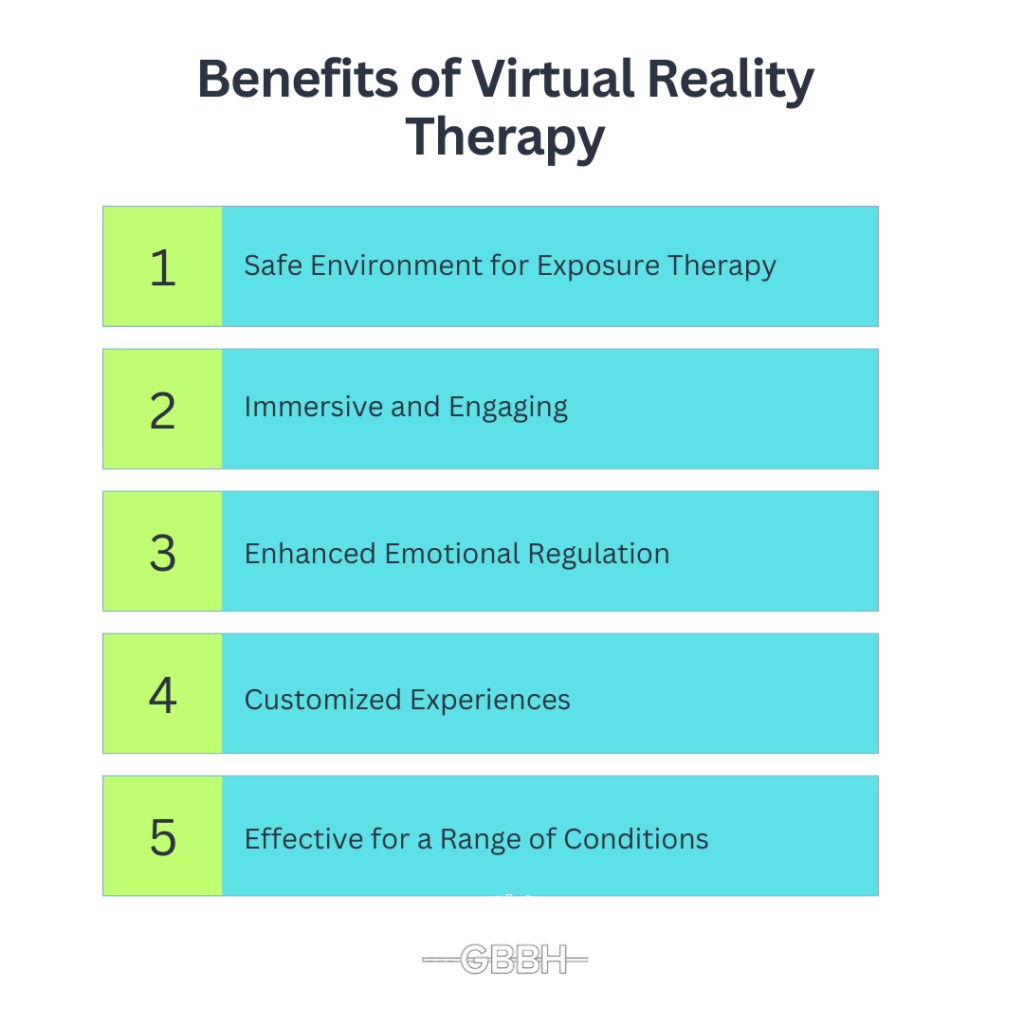Virtual Reality Therapy (VRT) is an innovative approach that uses immersive technology to help individuals confront and manage mental health challenges in a controlled and safe environment. By simulating real-life scenarios, virtual reality provides a unique space for individuals to face fears, practice coping strategies, and develop emotional resilience. As mental health treatment evolves, Virtual Reality Therapy is proving to be a powerful tool in programs like cognitive-behavioral therapy, group therapy, and even specialized care such as LGBTQ+ programs.
At Greater Boston Behavioral Health, we are committed to offering cutting-edge treatments, including Virtual Reality Therapy, as part of our comprehensive mental health therapy programs. Whether you’re navigating anxiety & depression, PTSD, or phobias, VRT can be a vital component of your mental health journey.
Mental health has grown in importance in the last few years. As a result, innovative treatments are emerging, one of which is Virtual Reality (VR) therapy. This exciting approach is transforming how we address mental health issues, making it a valuable addition to mental health programs offered at treatment centers, especially in places like Massachusetts.
What is Virtual Reality Therapy?
Virtual Reality therapy is an advanced technique that uses VR technology to create immersive environments for patients. By engaging with VR, patients can experience situations that may be challenging in real life, helping them build confidence and resilience.
Benefits of VR Therapy
One of the significant benefits of VR therapy is its ability to provide exposure therapy, a technique often used in cognitive-behavioral therapy (CBT). VR therapy can enhance this process by allowing patients to face their fears in a controlled and supportive environment.
For instance, someone with social anxiety might practice interacting in social settings within a VR scenario. This exposure can help them feel more comfortable when faced with similar situations in real life. The combination of traditional therapy techniques with cutting-edge technology offers new hope for many individuals seeking help at a mental health treatment center in Massachusetts.
Integration with Traditional Therapies
VR therapy can work alongside established treatments like cognitive-behavioral therapy and dialectical behavior therapy (DBT). While CBT focuses on identifying and changing unhelpful thoughts and behaviors, DBT emphasizes emotional regulation and interpersonal effectiveness. Integrating VR with these therapies can enhance the therapeutic process.
For example, during a DBT session, a therapist might use VR to help a patient practice mindfulness skills in a calming virtual environment. This technique allows individuals to learn and apply skills they can use in their daily lives. The immersive nature of VR can make these lessons more impactful, fostering deeper connections between the patient and the skills being taught.
How Virtual Reality Therapy Works
Virtual Reality Therapy uses headsets and computer-generated environments to immerse individuals in lifelike scenarios that can trigger specific emotions or responses. In this virtual space, individuals can safely confront situations that might be difficult to face in real life, all while being guided by a trained therapist. The controlled exposure to challenging situations allows for more effective mental health treatment and faster desensitization.
For example:
- Anxiety Disorders: Individuals struggling with social anxiety can practice interacting in virtual social situations, helping them gradually reduce anxiety in real-life interactions.
- PTSD: Veterans and trauma survivors can revisit past experiences in a controlled environment, working through the trauma at their own pace with therapeutic support.
- Phobias: VRT allows individuals to face fears like heights, flying, or public speaking, which they can work on incrementally to decrease the emotional response over time.
Benefits of Virtual Reality Therapy
- Safe Environment for Exposure Therapy: VRT provides a safe, controlled setting where individuals can confront distressing situations without real-world consequences.
- Immersive and Engaging: The interactive nature of virtual reality makes it highly engaging, allowing individuals to focus on the therapy process more effectively than with traditional methods.
- Enhanced Emotional Regulation: As individuals navigate challenging situations in the virtual world, they learn techniques for emotional regulation that can be applied in real life.
- Customized Experiences: Therapists can tailor the virtual scenarios to meet each patient’s unique needs, ensuring the therapy targets specific fears or triggers.
- Effective for a Range of Conditions: VRT is proving beneficial for anxiety, depression, PTSD, phobias, and even substance use disorders, as it allows for hands-on practice in managing emotional responses.
Effective Mental Health Therapy Programs
Many mental health therapy programs are beginning to incorporate VR therapy as part of their offerings. This innovation allows patients to experience different therapeutic approaches tailored to their needs. In a mental health treatment center in Massachusetts, for example, individuals can access VR therapy as part of a comprehensive treatment plan.
These programs often include individual therapy sessions, group therapy, and skill-building workshops. By integrating VR therapy into their services, treatment centers can provide a well-rounded approach that addresses various aspects of mental health. This approach encourages patients to engage more fully in their treatment, leading to better outcomes.
Overcoming Barriers to Treatment
Despite its many benefits, some individuals may still be hesitant to try VR therapy. Misconceptions about technology or fears about the unknown can create barriers to treatment. However, mental health programs aim to educate patients about the process and its potential benefits.
Many treatment centers offer informational sessions to introduce patients to VR therapy. By demonstrating how the technology works and sharing success stories, they can help alleviate fears and encourage participation. Patients often find that once they experience VR therapy, they are more open to exploring its potential.
Applications of Virtual Reality Therapy at Greater Boston Behavioral Health
At Greater Boston Behavioral Health, we integrate Virtual Reality Therapy into various mental health treatment programs to enhance therapeutic outcomes. Some applications include:
- Cognitive-Behavioral Therapy (CBT): VRT complements Cognitive-Behavioral Therapy by providing real-time scenarios where individuals can challenge negative thought patterns and practice healthier coping mechanisms.
- Dialectical Behavior Therapy (DBT): VRT can assist in mindfulness training, emotional regulation, and distress tolerance by placing individuals in immersive environments that challenge their emotional resilience with Dialectical Behavior Therapy.
- Group Therapy: VRT can simulate group settings, Group therapy offering a safe space for those who struggle with social anxiety to practice communication and interpersonal skills.
- Family Therapy: Virtual environments can simulate family dynamics, Family therapy offering an interactive way for families to explore relationship challenges and practice conflict resolution.
- Intensive Outpatient Programs (IOP): For individuals in more intensive treatment, VRT can provide immersive therapeutic experiences that target specific emotional triggers or behaviors.
The Future of Mental Health Treatment with Virtual Reality
Virtual Reality Therapy is still an emerging field, but its potential for mental health treatment is undeniable. As more research supports its effectiveness, VRT is expected to become a standard component in many mental health treatment centers in Massachusetts and beyond.
At Greater Boston Behavioral Health, we are committed to staying at the forefront of these advancements to provide the best care possible. We offer VRT as part of our holistic approach to mental health, incorporating it alongside traditional therapies like CBT, DBT, family therapy, and our outpatient programs. Whether you’re dealing with trauma, anxiety, or relationship challenges, Virtual Reality Therapy could be the innovative solution that helps you move forward.
Conclusion
Virtual Reality therapy is a groundbreaking development in the field of mental health. By combining technology with traditional therapeutic techniques, it offers new hope for those struggling with mental health issues. Mental health programs that include VR therapy can enhance treatment effectiveness and foster greater patient engagement.
As more mental health treatment centers, especially in Massachusetts, adopt these innovative approaches, we can expect to see significant advancements in mental health care. With continued education and support, individuals can learn to navigate their mental health journeys more effectively, ultimately leading to improved well-being and quality of life. Embracing new technologies like VR therapy is just one step toward a brighter future in mental health treatment. Call us at (888)278-0716 today to learn more about our services and how we can help you on your journey to recovery!
FAQ on Virtual Reality Therapy for Mental Health
What is Virtual Reality Therapy (VRT)?
Virtual Reality Therapy (VRT) uses immersive technology to simulate real-life situations in a controlled environment, allowing individuals to confront fears and practice coping strategies in a safe setting.
What mental health conditions can VRT help treat?
VRT is effective for a variety of conditions, including anxiety disorders, PTSD, phobias, depression, and substance use disorders. It helps individuals practice emotional regulation and confront challenging situations.
How does Virtual Reality Therapy work?
Using VR headsets and computer-generated simulations, individuals are placed in lifelike scenarios that evoke specific emotions or triggers. A therapist guides the individual through these scenarios to help them develop coping strategies.
Can Virtual Reality Therapy be combined with other treatments?
Yes, VRT can complement traditional therapies like cognitive-behavioral therapy (CBT), dialectical behavior therapy (DBT), group therapy, and family therapy to enhance therapeutic outcomes.
Is Virtual Reality Therapy safe?
Yes, VRT is conducted in a controlled and supervised environment by trained therapists, ensuring safety while individuals confront challenging situations.
How can I access Virtual Reality Therapy?
At Greater Boston Behavioral Health, we offer VRT as part of our comprehensive mental health treatment programs, including intensive outpatient programs and day treatment programs.


